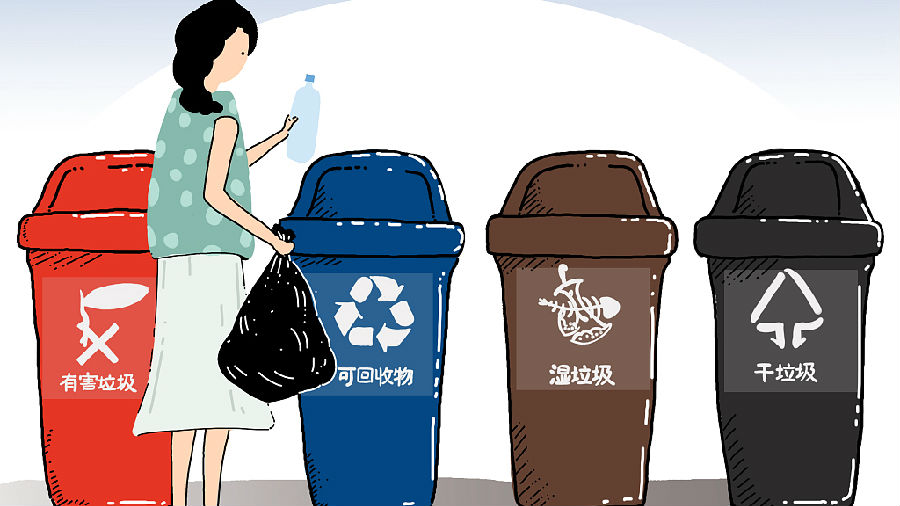(单词翻译:单击)
City gets serious about waste
上海垃圾分类时代已至,其他城市还远吗?
If you live in Shanghai, you might have to take a "lesson" in sorting garbage, as the city recently introduced new garbage-sorting regulations.
如果你生活在上海,你或许得上“一堂垃圾分类课”,因为该市近期出台了全新的垃圾分类条例。
It's now required that people should sort garbage into four categories, namely recyclable, harmful, dry and wet waste. However, if people fail to sort their garbage properly, they can be fined up to 200 yuan.
如今,人们需要将垃圾分成“可回收物、有害垃圾、干垃圾、湿垃圾”四大类。混合投放垃圾最高可要处以200元罚款。
More cities are introducing similar regulations, following the practice in Shanghai. By the end of 2020, garbage-sorting systems will have been built in 46 major Chinese cities, including Beijing and Shenzhen, reported People's Daily.
继上海之后,越来越多的城市都在推出类似的条例。据《人民日报》报道,2020年底前,包括北京、深圳在内的全国46个重点城市将基本建成垃圾分类处理系统。
According to a study by the Policy Research Center for Environment and Economy, under the Ministry of Ecology and Environment, over 90 percent of the public believe that garbage sorting is important for the protection of the environment.
国家生态环境部环境与经济政策研究中心的一项研究显示,超过90%的大众认为垃圾分类对环境保护是重要的。
However, garbage sorting is still a big problem in China. Only 30 percent of participants said they think they are adequately sorting their trash, the study noted.
但垃圾分类在中国仍是一大问题。该研究指出,只有30%的受访者认为自己充分地进行了垃圾分类。

According to Xinhua News Agency, it's partly because many people lack the willingness to sort their own waste. In the past, some previous garbage regulations didn't give clear fines for people who failed to sort garbage.
据新华社报道,这种情况某种程度上源于许多人缺乏垃圾分类的意愿。过去的一些垃圾分类条例也并未明确规定对混合投放垃圾者所处的罚款数额。
"It's a must to have a legal guarantee to promote garbage sorting," Liu Jianguo, a professor from Tsinghua University, told China Daily.
“必须要有一套法律保障来推动垃圾分类,”清华大学教授刘建国在接受《中国日报》采访时表示。
Liu Xinyu, a researcher of the Shanghai Academy of Social Sciences, told China Daily that the importance of the new regulations in Shanghai is to change the past voluntary action into compulsory action for everyone.
上海社会科学院研究员刘新宇在接受《中国日报》采访时表示,上海这项新条例的重要之处在于将过去的自愿行为变为每个人的必修课。
Aside from China, many other foreign countries have also introduced garbage-sorting regulations. In Japan, waste sorting has become a basic survival skill, reported Xinhua. There is a fixed time for disposal of each kind of garbage and littering can result in high fines and even jail time.
除了中国以外,许多其他国家也出台了垃圾分类的相关规定。据新华社报道,在日本,垃圾分类已经成为一项必备的生活技能。每种垃圾都有固定的处理时间,而乱扔垃圾者会面临高额罚款甚至监禁。
In Germany too, people are asked to sort waste into specific categories, reported HuffPost. For example, in Berlin, people have yellow bins for plastic and metals and blue bins for paper and cardboard.
据《赫芬顿邮报》报道,在德国,人们也会被要求将垃圾分成特定的种类。比如,在柏林,人们会用黄色垃圾桶装塑料和金属,蓝色垃圾桶装纸制品。


